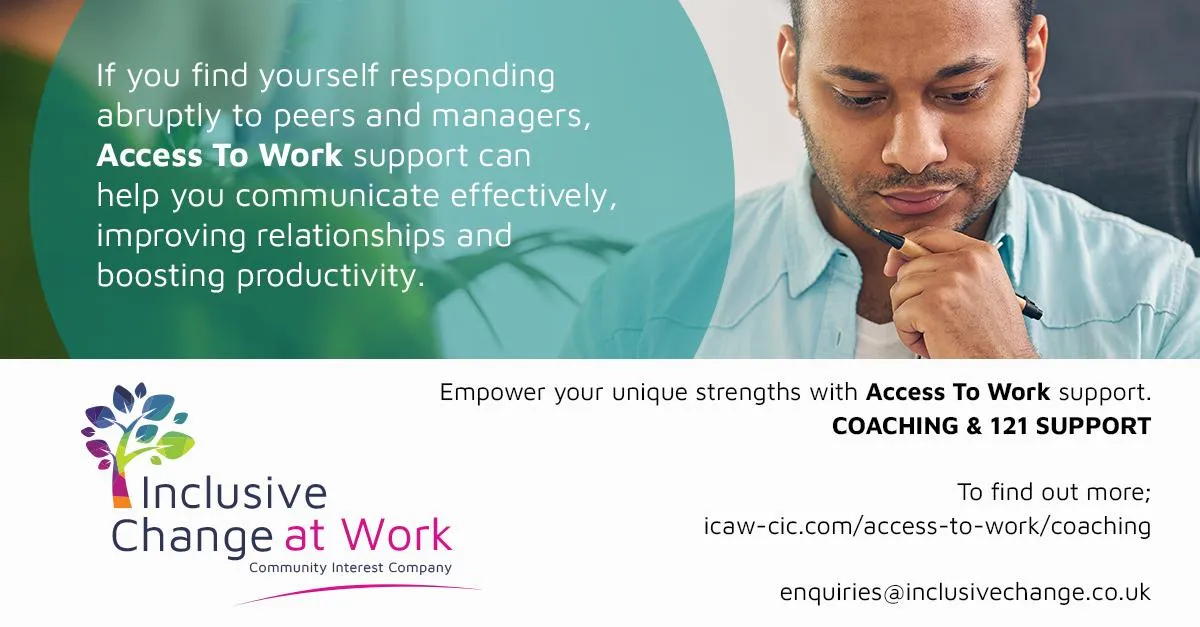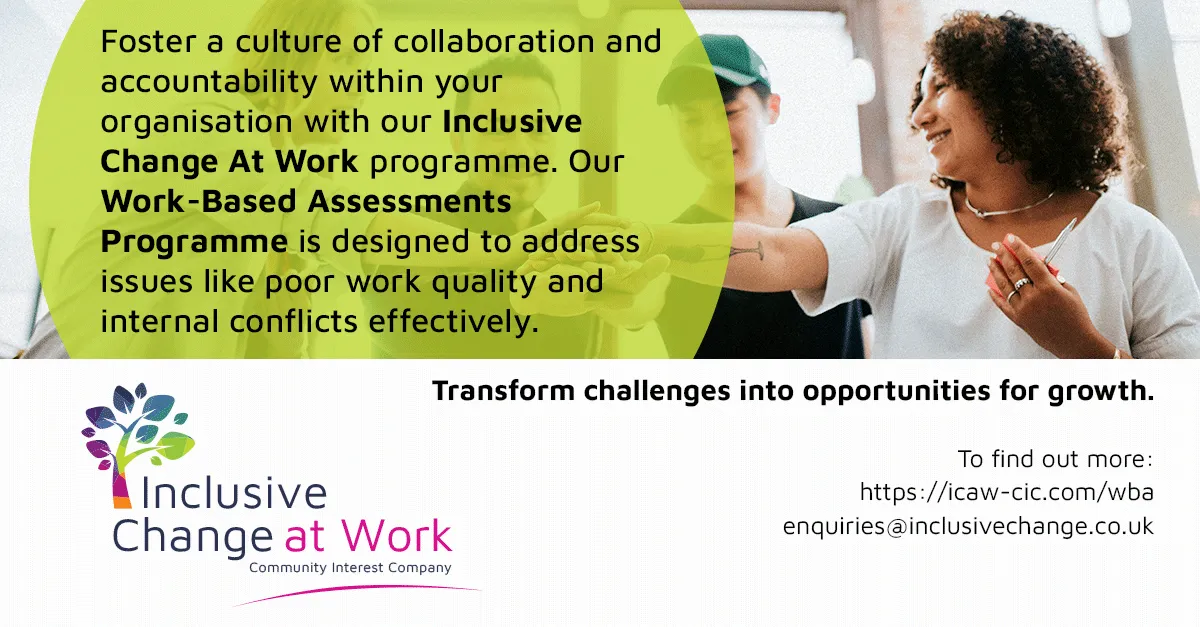
Welcome!
Thanks for signing up to our free webinar. This is the recording from Daniel Biddle and Lucy Smith from Inclusive Change At Work CiC.
Access to Work is an important initiative by the UK Department for Work and Pensions (DWP) designed to support disabled individuals in overcoming work-related barriers.
Dan and Lucy will take you through all the questions you may have about the fund.
Want to find out how we can help you email [email protected]



The Liberating Joy of Unmasking
For many neurodivergent individuals, work can feel like a stage where they must play a role to fit in. This act of "masking" (adopting behaviours, mannerisms, or ways of speaking to appear neurotypical), can be exhausting and isolating. It’s a daily, invisible performance driven by the fear of judgement or misunderstanding. But what happens when the mask comes off? What does it feel like to be truly comfortable and accepted at work? For neurodivergent employees, this can be nothing short of transformative.
The Heavy Weight of Masking
Before delving into the joy of unmasking, it’s important to understand the toll masking takes. Masking often involves suppressing natural instincts: avoiding stimming behaviours like fidgeting, over-rehearsing speech, or feigning interest in small talk. While it might help avoid awkward questions or prejudices, masking comes at a cost.
Becca from Inclusive Change shares: “Pretending to keep up with everyone else is a reflex mechanism but actually, we're not serving anyone by pretending, least of all ourselves. Accepting us as we are is part of unmasking with ADHD, and it's beneficial to everyone”.
Emotional exhaustion: Pretending to be someone you're not is draining. Many neurodivergent people leave work feeling mentally and physically depleted.
Anxiety and self-doubt: The constant effort to fit in can make individuals second-guess their every move, fostering imposter syndrome.
Loss of authenticity: Masking stifles self-expression, making it hard to form genuine connections with co-workers.
What Unmasking Feels Like
When neurodivergent individuals find workplaces that value authenticity and diversity, a profound shift happens. Here’s how unmasking can feel:
Relief and Lightness. Unmasking often begins with a deep exhale, a sense of relief that comes from no longer pretending. When colleagues and managers encourage authenticity, it feels like shedding a heavy coat after years of wearing it in stifling heat. The freedom to be oneself can lead to newfound energy and focus.
Increased Confidence. When neurodivergent employees feel accepted, they start to trust their abilities and perspectives. This confidence can unlock creative problem-solving, innovation, and leadership qualities that were previously overshadowed by the effort to conform.
Stronger Relationships. Authenticity fosters trust. When neurodivergent individuals can openly discuss their needs, quirks, or challenges, it builds understanding among colleagues. Teams become more cohesive and accepting, when everyone feels they can bring their whole selves to the table.
Joy in Self-Expression. Unmasking allows neurodivergent employees to embrace behaviours that help them thrive, whether it’s doodling during meetings to maintain focus, using noise-cancelling headphones, or speaking candidly about sensory sensitivities. These adjustments often lead to increased productivity and happiness.
How Workplaces Can Support Unmasking
Creating an environment where neurodivergent employees feel comfortable unmasking requires intention and empathy. Here are some steps employers can take:
Create a Culture of Acceptance. Normalise discussions around neurodiversity. Celebrate and recognise differences as strengths rather than tolerating them. Use unique skills to the team's benefit.
Provide Flexibility. Allow remote work, flexible hours, or nontraditional office setups. Recognise that productivity can look different for everyone.
Train Leadership and Teams. Equip managers and teams with awareness training on neurodiversity, focusing on how to support colleagues effectively.
Solicit Feedback. Create opportunities for anonymous channels for employees to share their needs without fear of stigma.
Model Vulnerability. When leaders and peers share their own challenges or differences, it encourages neurodivergent employees to do the same.
A Shared Celebration of Authenticity
Unmasking doesn’t just benefit neurodivergent individuals; it enriches workplaces as a whole. When employees feel free to be themselves, they bring their best ideas and most genuine energy to their roles. For neurodivergent individuals, unmasking transforms work from a place of constant tension to one of possibility and joy.
Inclusive workplaces prove that there’s power in letting people show up as they are. And for those who’ve spent their lives masking, the ability to unmask at work can feel like finally stepping into the sunlight after years of standing in the shadows. It’s not just a relief, it’s a revolution!
To find out more about Inclusive Changes awareness training and opportunities for management development, get in touch: [email protected] or take a look at our training prospectus vis this link.
Inclusive Change At Work CiC
Bradbury House
Wheatfield Road
Bradley Stoke
Bristol
BS32 9DB
Companies House: 13271923
ICO registration: ZZB293922
UK register of Learning providers
UKRLP: 10090653
Privacy Policy | Terms and Conditions
Copyright © 2024 Inclusive Change At Work CiC | All Rights Reserved
LinkedIn